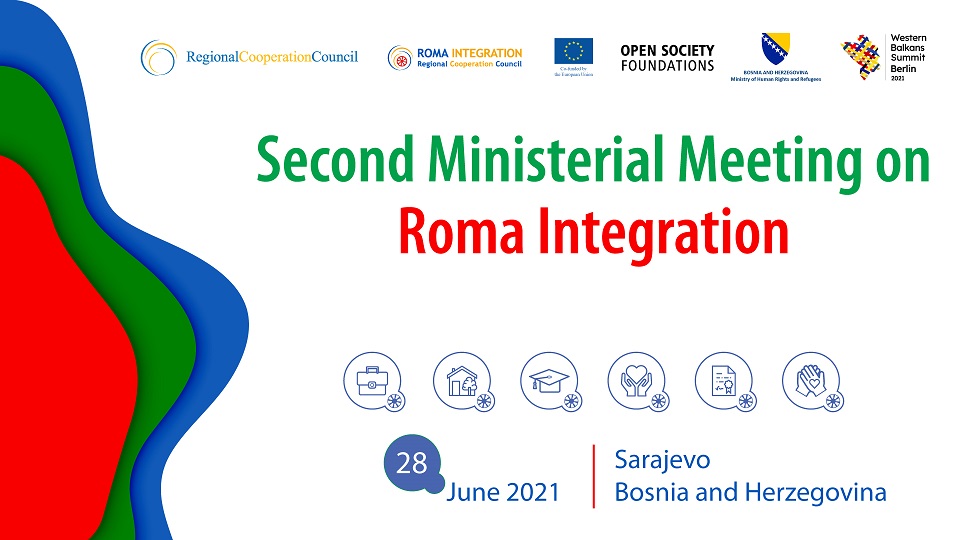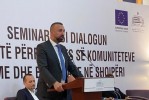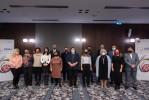Conclusions of the Second Ministerial Meeting on Roma Integration
- 30 Jun 2021
- News

Ministerial meeting in Sarajevo, Bosnia and Herzegovina
Following the endorsement of the Declaration of Western Balkans Partners on Roma Integration within the EU Enlargement Process (Poznan Declaration) at the Western Balkans Leaders’ Summit in Poznan, Poland on 05 July 2019, the Ministry of Human Rights and Refugees of Bosnia and Herzegovina and the Regional Cooperation Council co-organized the second Ministerial meeting on 28 June 2021 to assess the progress made so-far in achieving the Poznan Declaration objectives and discuss the further steps necessary to progress with the Declaration targets and commitments.
The Ministers of the Western Balkans responsible for Roma integration:
RECALLING the pledges made with the Declaration of Western Balkans Partners on Roma integration within the EU Enlargement Process,
ACTING upon the commitments taken at the first Ministerial meeting organized by the Government of Albania and the Regional Cooperation Council on 27 October 2020,
UNDERLINING the significance and reference of the EU Roma Strategic Framework for equality, inclusion and participation 2020-2030 for the Western Balkans region,
NOTING the COVID-19 pandemic crisis has significantly deteriorated the economic situation of many vulnerable communities, including Roma,
RECOGNIZING the importance of the Economic and Investment Plan for the Western Balkans, that highlights the significance of Roma integration in human capital investments, including in access to education and labour market participation,
ACKNOWLEDGING that Roma integration must be an integral part of the general socio-economic strategies, policies and measures, including, but not limited to, the Digital Agenda and Green Agenda for the Western Balkans,
AGREE to strengthen the ongoing work on Roma integration in general, and more specifically:
On employment, the Ministers acknowledge the value of actively supporting the transition of Roma from informal to formal economy. They agree that support should be directed notably through incentives, reforms and investments. The Regional Cooperation Council is working with several governments in the region on developing policy programs on employment which can significantly contribute to enhancing the employment rate of Roma and other vulnerable groups, and reduce informal economic activities. The Ministers commit to explore further opportunities and develop similar policy programs by the next Ministerial meeting on Roma integration in close cooperation with the Regional Cooperation Council.
On housing, the completion of the geographic mapping exercise of Roma settlements by the end of 2021, will provide a clear understanding of the needs for investments in communal infrastructure, legalization and comprehensive social housing schemes. The Ministers welcome the Western Balkans Investment Framework as a possible tool to support these integration measures for vulnerable groups, including Roma and agree to address the shortcomings identified by the mapping exercise in close cooperation with the relevant authorities. The Regional Cooperation Council stands ready to provide the necessary technical assistance for developing mature funding proposals.
The Ministers, in close cooperation with the relevant authorities, will ensure that the needs of vulnerable Roma are taken into account in the implementation of the COVID-19 recovery plans. This will be complemented by enhancing regional cooperation and sharing good practices, while providing greater protection of Roma and improving their socio-economic status.
The Ministers agree to explore all windows of opportunities to ensure Roma benefit from the general socio-economic strategies and plans, including the digital and green transformations of the region. In line with this, the Ministers confirm that Roma must be included in the process of operationalizing the Green Agenda, in particular within measures related to circular economy, environmental protection and climate actions; and the Digital Agenda, specifically digital education, digital skills and literacy. The Regional Cooperation Council will provide the necessary assistance to facilitate this process.
The Ministers confirm that the process of geographic mapping exercise of Roma settlements is ongoing and will be completed by the end of 2021. The roadmaps towards ending statelessness among Roma have been finalized and will be incorporated in the new Strategies for Roma integration in each economy. The process to establish robust monitoring and reporting systems to measure the progress on Roma integration policies has been discussed with all Statistical Offices in the region. The Ministers confirm that by October 2021 their national Roma integration strategies will be developed, updated and aligned with the 2020-2030 EU Roma Strategic Framework for equality, inclusion and participation.
The Ministers agree to meet at a follow up Ministerial meeting in 2022 in Montenegro to discuss the implementation of the above mentioned commitments and the overall progress on implementation of the targets specified in the Poznan Declaration.
Final conclusions - Second Ministerial meeting on Roma integration






